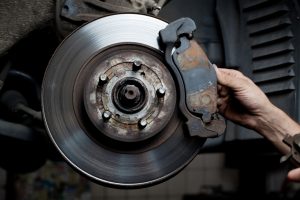Why High Quality Brake Pads Are Important For Your Vehicle
Why High Quality Brake Pads Are Important For Your Vehicle
Other than getting the vehicle started, the next most important step is to get it stopped. Vehicles that will not start cannot kill you unless they fall on you. A vehicle that does not stop can kill you. A car or truck without brakes is a rolling death trap.

Stopping Power Needs to Match Going Power
The best way to make sure a vehicle will stop when you push the brake pedal is to match your braking capability to your potential speed capability. Heavier or more powerful vehicles must have equally strong brakes. Your local auto parts store can help with correct brake parts.
Does that parachute on a dragster ring a bell? Now, I do not recommend a parachute for your street vehicle, but your brakes had better be up to the task.
Much different from that dragster parachute, your street vehicle often must stop abruptly and without the convenience of a half mile stopping distance these high powered quarter milers enjoy. To ensure your vehicle’s stopping, the brake system has to be kept in top condition.
Brake Science
To better understand brakes and how to get the most stopping power out of them, it helps to know brake system parts and how they work together to produce the necessary stopping power.
Hydraulics, braking components and direct force from the driver combine to give a vehicle the ability to stop at a second’s notice. The brake master cylinder, booster and push rod, valves and lines store and transmit the hydraulic brake fluid. The hydraulics part of the braking system dramatically increases braking power. https://shop.advanceautoparts.com/r/advice/car-maintenance/brakes-basics-the-components-in-the-braking-system
These major brake parts, found at any auto parts store, and the fluid pumped to them give the pedal, drum (if so equipped) and disc brakes, calipers, cylinders and pads the needed direct force when the driver needs to slow or stop the vehicle.
Both sets of brakes are controlled by the master cylinder. The drum brakes at the rear wheels (if so equipped) use hydraulics and brake shoes to slow and stop them. The disc brakes at the front wheels (or at all four wheels) depend on hydraulics and pads to slow or stop them.
When the driver applies pressure to the brake pedal, the brake booster engages. This mechanical process dramatically increases the force sending it to the master cylinder.
The master cylinder controls the amount of force to both the front and rear brake components at the wheels. The entire system works in unison to slow or stop the vehicle.
Critical Parts Working Together
The hydraulics, brake discs, also called rotors, and the pads are the key parts relied upon for braking power. Brake shoes, if the vehicle has drum brakes at the rear, pads and rotors are the auto parts which wear out and need replacing most often.
Hydraulic parts also wear out or stop working properly and need replacing, but they do not normally need repair as regularly. Any complete brake inspection takes both into consideration.
Brake Pads
Brake pads and shoes are the parts which bear the brunt of the direct force when brakes are applied. Consequently, they are the braking components which need replacing more often. While brake shoes do wear out, brake pads receive the most force and wear out quickest
Car parts like brake calipers, rotors and pads are the most critical parts of the front brakes provided that the hydraulics are in good shape. Think of these three parts as the calipers supplying the fluid and multiplied force to directly squeeze the rotor with the pads in order to stop.
Front wheel breaking is kind of like holding a disc with your forefinger and thumb; that is a simple analogy to visualize what the front brakes do when brakes are applied. https://www.autorepairboulder.com/brake-pads-oem-aftermarket/
How Front Brake Pads Work
The calipers force the pads to basically grip the brake rotor. For the brake pad to do a maximum job of stopping the vehicle, it must have a glass smooth rotor to grip. Over time, repeated ‘gripping’ wears grooves into the discs or rotors.
Grooved rotors make the pads’ job more difficult and accelerate the wear of the pad. As this wear worsens, you start hearing squeaking and notice that it takes longer to stop the vehicle. This means brake pad replacement time.
Choosing the Best Replacement Brake Pads
No other car parts affect the stopping quality of a brake system than brake pads. Of course, the pads are dependent upon smooth rotors for the most gripping power. Given that the rotors are in good shape, the next major concern is the pad quality.
Too many people skimp on brake pad quality and end up spending money more frequently to replace them. Poor quality brake pads not only wear quicker, but they create fine dust as they wear.
The heat from repeated braking singes the brake pad dust. This creates a glaze on the rotor, and the glaze causes the squeaking you hear on so many vehicles.
Want to know who is buying cheap brake pads, just listen. Also check out their front wheels. You will see dark gray to black brake pad dust in the wheels. This is a vehicle in need of brake pad replacement, and maybe the rotors turned or replaced.
To avoid unnecessarily frequent brake pad replacement, refer to your owner’s manual. Buy the OEM (Original Equipment Manufacturer) or higher grade brake pads. You will be less likely to have to deal with brake system aggravation and even failure. http://safebraking.com/brake-faq-what-are-the-differences-between-oem-oes-and-aftermarket-brake-pads/
